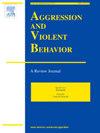自我相关认知与儿童和青少年网络欺凌受害之间的关系:一项系统综述和荟萃分析
IF 3.4
2区 心理学
Q1 CRIMINOLOGY & PENOLOGY
引用次数: 0
摘要
自我效能感、自尊、自我概念和自责被认为是网络伤害发展和维持的潜在因素,不仅是单向的,而且是循环的。我们的目标是综合现有证据并评估这些自我相关认知与网络受害之间关系的潜在调节因子。我们检索了五个电子数据库(PsycINFO, PubMed, Scopus, Web of Science和Cochrane),从成立到2022年10月。总共纳入了81项研究,包括110,095名平均年龄为11.51岁的儿童和青少年。近一半的研究被评为质量一般。在自我相关认知中,高水平的网络受害与低水平的自我概念、低自我效能和低自尊相关。在我们的回顾中,与自责相关的认知与网络受害者没有统计学上的显著关联。这些发现包括高度异质性,并且在敏感性分析中是一致的。元回归分析显示,参与者数量显著调节自尊与网络受害的关系,但受害者比例和参与者平均年龄没有显著调节作用。这项预登记的系统回顾和荟萃分析显示,自我相关认知与网络受害之间存在适度但统计上显著的相关性。讨论讨论了对未来研究和反网络欺凌计划的影响。本文章由计算机程序翻译,如有差异,请以英文原文为准。
Association between self-related cognitions and cyberbullying victimization in children and adolescents: A systematic review and meta-analysis
Self-efficacy, self-esteem, self-concept, and self-blame have been proposed as potential factors in the development and maintenance of cybervictimization in a unidirectional, but also in a cyclic paradigm. Our objective was to synthesize the existing evidence and assess potential moderators of the relationship between these self-related cognitions and cybervictimization. We searched five electronic databases (PsycINFO, PubMed, Scopus, Web of Science and Cochrane) from inception until October 2022. A total of 81 studies were included, encompassing a cohort of 110,095 children and adolescents with a mean age of 11.51 years. Nearly half of the studies were rated as having fair quality. Across the examined self-related cognitions, high level of cybervictimization was associated with low level of self-concept, low self-efficacy and low self-esteem. Cognitions related to self-blame were not statistically significantly associated with cybervictimization in our review. These findings included high heterogeneity and were consistent across sensitivity analyses. Meta-regression analyses revealed that the number of participants significantly moderated the relationship between self-esteem and cybervictimization, but the percentage of victims and mean age of participants did not exhibit significant moderation effects. This preregistered systematic review and meta-analysis showed modest yet statistically significant correlations between self-related cognitions and cybervictimization. The discussion addresses the implications for future research and anti-cyberbullying programs.
PROSPERO reference number CRD42021289512.
求助全文
通过发布文献求助,成功后即可免费获取论文全文。
去求助
来源期刊

Aggression and Violent Behavior
Multiple-
CiteScore
7.50
自引率
4.30%
发文量
63
期刊介绍:
Aggression and Violent Behavior, A Review Journal is a multidisciplinary journal that publishes substantive and integrative reviews, as well as summary reports of innovative ongoing clinical research programs on a wide range of topics germane to the field of aggression and violent behavior. Papers encompass a large variety of issues, populations, and domains, including homicide (serial, spree, and mass murder: sexual homicide), sexual deviance and assault (rape, serial rape, child molestation, paraphilias), child and youth violence (firesetting, gang violence, juvenile sexual offending), family violence (child physical and sexual abuse, child neglect, incest, spouse and elder abuse), genetic predispositions, and the physiological basis of aggression.
 求助内容:
求助内容: 应助结果提醒方式:
应助结果提醒方式:


